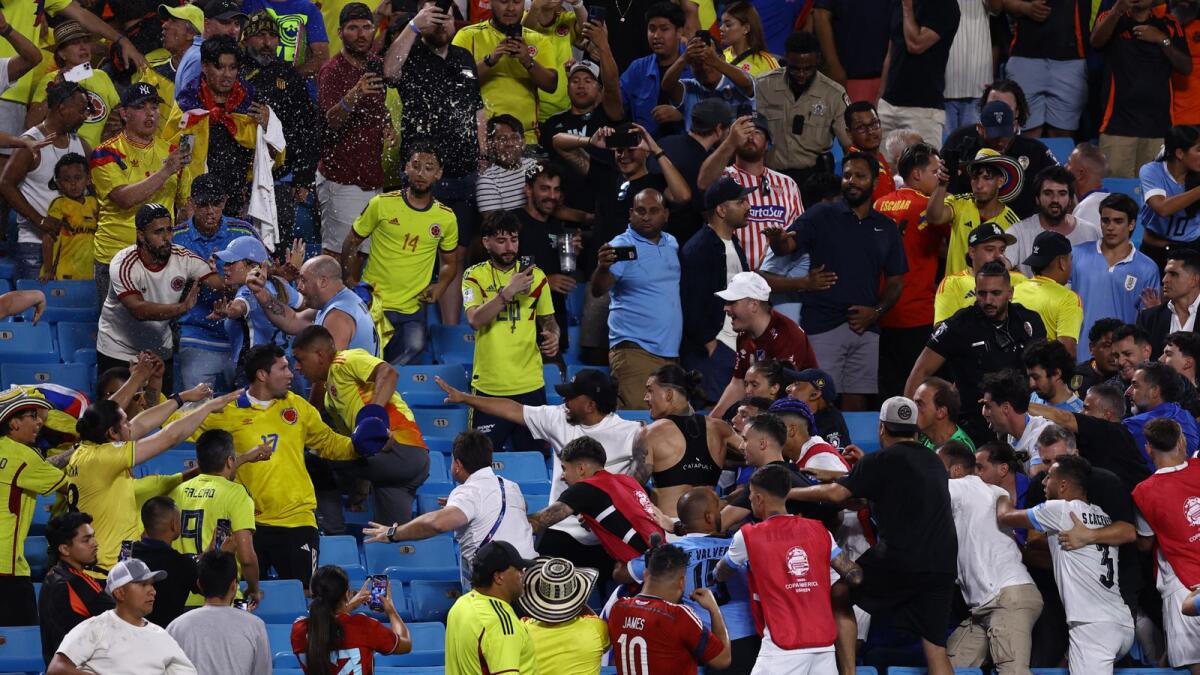Uruguay players found themselves involved in a post-match altercation with Colombian fans following their defeat in the Copa America semifinal. After Colombia secured a 1-0 victory, videos surfaced on social media showing Uruguay players entering the stands and engaging in physical altercations with opposition fans. South American football’s governing body CONMEBOL has launched an investigation into the incident and strongly condemned any acts of violence that disrupt the spirit of the game. They emphasized the importance of soccer uniting people through positive values and denounced intolerance and violence on and off the field.
Some of Uruguay’s players, including Darwin Nunez and Ronald Araujo, were reportedly at the forefront of the scuffle. Team captain Jose Maria Gimenez expressed concern for the safety of their families in the stands, stating that they had to defend themselves when faced with a lack of police presence. The players were portrayed as reacting to the actions of a few individuals who had consumed excessive alcohol and did not know how to behave. The situation escalated further as players and staff from both teams were involved in a confrontation on the field after the final whistle, adding to the chaotic scene.
Uruguay coach Marcelo Bielsa acknowledged the existence of some arguments on the field but was unaware of the severity of the situation until later. He believed that the players were simply thanking the fans for their support but was disappointed to learn that issues had arisen. The match concluded with Colombia securing a spot in the final against Argentina, while Uruguay would face Canada in the third-place playoff. Despite the on-field results, the off-field incidents marred the competitive spirit of the tournament and raised concerns about player and fan safety in future events.
The altercation between the Uruguay players and Colombian fans highlights the volatile nature of football matches and the emotions that can run high in intense competitions. It also underscores the importance of security measures and crowd control to prevent such incidents from escalating further. The involvement of players in the scuffle raises questions about professionalism and sportsmanship, as their actions off the field can impact their reputation and the image of the sport as a whole. The post-match violence serves as a reminder of the need for respect and tolerance in all aspects of the game, both on and off the field.
Moving forward, CONMEBOL and other football governing bodies will likely implement stricter security protocols to prevent similar incidents in the future. Players and staff will also be required to adhere to codes of conduct that promote respect, fair play, and peaceful interactions with fans and opponents. The role of technology and social media in capturing and disseminating such events will continue to shape the narrative around football matches and hold individuals accountable for their actions. Ultimately, the aftermath of the Uruguay-Colombia clash serves as a cautionary tale for the football community, emphasizing the importance of sportsmanship, civility, and safety at all levels of the game.
In conclusion, the post-match altercation between Uruguay players and Colombian fans during the Copa America semifinal has sparked controversy and raised concerns about violence and security in football matches. The incident serves as a stark reminder of the need to prioritize safety and respect in all aspects of the game, from the playing field to the stands. By addressing the underlying issues that led to the confrontation, football authorities can work towards creating a more harmonious and inclusive environment for players, fans, and officials. The fallout from this incident will likely lead to increased scrutiny and accountability for player behavior, emphasizing the importance of upholding the values of sportsmanship and fair play in football and beyond.











